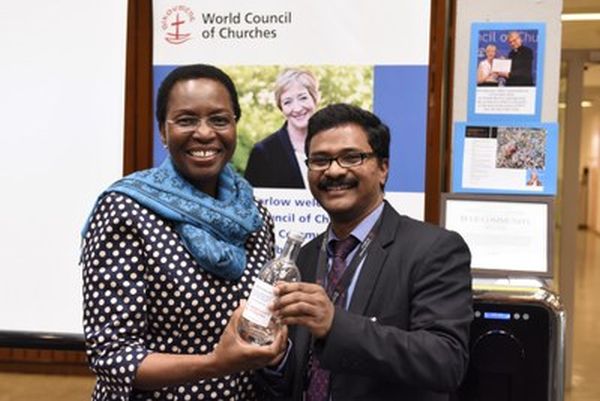

WEEK 7 - Blue Community: Churches response to the right to water
By Prof. Dr Isabel Apawo Phiri
Dr Phiri is the deputy general secretary of the World Council of Churches (WCC) and responsible for WCC’s work on Public Witness and Diakonia. A Malawian by nationality, Apawo Phiri was a professor of African theology, dean and head of the School of Religion, Philosophy and Classics, and director of the Centre for Constructive Theology at the University of KwaZulu Natal in Pietermaritzburg, South Africa.
Introduction
Come, all you who are thirsty, come to the waters; and you who have no money, come, buy and eat! Come, buy… without money and without cost. /Isaiah 55:1/
For the past few years, I had the opportunity to represent the leadership of the World Council of Churches (WCC) to accompany the Ecumenical Water Network in its efforts to urge member churches of the WCC to become a blue community. On 25 October 2016 the WCC became a Blue Community at a public event I moderated at the Ecumenical Centre in Geneva. Dr Maude Barlow from the Blue Planet Project, Canada, awarded a certificate to the WCC, welcoming us into the Blue Community and also inaugurated the tap-water-based dispensers in the Ecumenical Centre.
Let me explain three criteria of being a Blue Community:
- Recognizing water as a human right.
- Saying “no” to the sale/use of bottled water in places where tap water is safe to drink.
- Promoting publicly financed, owned and operated drinking water and waste water treatment services.
In line with the WCC’s commitment towards a Blue Community, we have now personalized glass water bottles for the WCC staff and visitors. Therefore, we do not promote bottled water in the WCC premises, because tap water is safe to drink.
In fact, earlier in 2015, the WCC’s Ecumenical Water Network (EWN) issued an appeal in which it urged its member churches to eliminate the use of bottled water in North America and Europe, where tap water is safe to drink. In a statement it said,
“The EWN strongly believes that among many impediments of realization of human right to water are the ‘bottled water’ industries.” It then went on to list some of the following compelling reasons to shun bottled water. To name a few:
1) “Bottled water” industries are involved in “land grabbing” and “water grabbing” to expand at the cost of barring the poor to access safe drinking water. Many times governments shun their responsibilities to provide safe drinking water to the poor through their water distribution system, because people have the alternative of “bottled water”. The availability of “bottled water” allows the elites to ignore governments’ failures to provide the necessary infrastructure to provide safe drinking water.
2) Bottling water wastes water: Typically, a litre of water is wasted for each litre of bottled and it takes three times as much water to create a plastic water bottle than it does to fill it.
3) Production of plastic for bottled water consumes a substantial quantity of fossil fuels and creates both air and water pollution.
4) The energy consumed in bottling and distributing bottled water is significant; if measured in terms of the oil equivalent, it takes ¼ litre of oil to produce and distribute a litre bottle of water. The greenhouse gas emissions as a result, burden our climate and aggravate climate change.